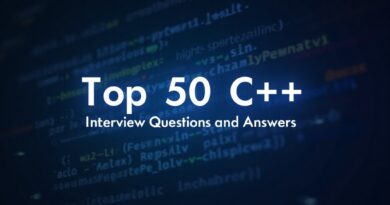DevOps Career Roadmap – Beginners to Professionals
DevOps Career Roadmap – Tools, Skills & Learning Resources for Beginners to Professionals
What is DevOps?
DevOps is a combination of Development (Dev) and Operations (Ops), focused on improving the collaboration between software developers and IT operations teams. It aims to deliver software faster, more reliably, and with higher efficiency through automation, continuous integration, and continuous delivery (CI/CD).
Today, DevOps is one of the most in-demand career paths for both freshers and experienced professionals due to the rise of cloud computing, microservices, and agile methodologies.
Why Choose a Career in DevOps?
Choosing DevOps means stepping into a fast-paced, high-impact domain with job roles that touch every part of the software development lifecycle.
Key reasons to choose DevOps:
-
High salary packages
-
Growing demand across industries
-
Opportunities in cloud engineering, automation, and site reliability
-
Versatile roles and continuous learning
Who Can Start a Career in DevOps?
Anyone with a background in:
-
Computer Science / IT
-
Software Development
-
System Administration / Networking
-
QA / Testing
-
Cloud Engineering
Even if you’re a student or fresher, you can start learning with the right roadmap and gradually build your portfolio.
Also Read,
| Web Development Roadmap – Frontend, Backend & Full Stack |
DevOps Career Roadmap: A Step-by-Step Guide
Step 1: Learn the Basics of OS, Networking & Scripting
Before diving into tools, understand foundational concepts:
-
Operating Systems: Linux (Ubuntu, CentOS)
-
Networking Basics: IPs, DNS, HTTP, TCP/IP
-
Scripting: Bash or Shell scripting, Python
📌 Real-world tip: Many companies use shell scripts for automation. Start by automating tasks like file backups or system updates.
Step 2: Understand Version Control Systems (VCS)
You must be proficient with Git and GitHub/GitLab:
-
Git commands: clone, commit, push, pull, branch, merge
-
GitHub/GitLab: for code hosting, CI/CD integrations, and issue tracking
🛠️ Tools: Git, GitHub, Bitbucket
📚 Learn: learngitbranching.js.org
Step 3: Master Continuous Integration / Continuous Delivery (CI/CD)
CI/CD is at the heart of DevOps. Learn how to:
-
Automate testing and deployments
-
Set up pipelines for building, testing, and deploying applications
🛠️ Popular Tools:
-
Jenkins
-
GitHub Actions
-
GitLab CI
-
CircleCI
📌 Example: Automate a Python app deployment using GitHub Actions and Docker.
Step 4: Learn Configuration Management
Tools in this category help manage infrastructure through code.
🛠️ Top Tools:
-
Ansible (agentless and beginner-friendly)
-
Puppet
-
Chef
📚 Use Case: Write Ansible playbooks to automate the installation of NGINX on multiple servers.
Step 5: Containerization with Docker
Containers help package applications with all dependencies.
-
Learn Docker commands:
docker build,docker run,docker-compose -
Understand Docker images, volumes, and networks
🛠️ Tools: Docker, Podman
📚 Practice: Containerize a Node.js app and run it locally.
Step 6: Orchestration with Kubernetes
Once you’re comfortable with Docker, move to Kubernetes, the industry standard for container orchestration.
-
Learn Pods, Services, Deployments
-
Set up Minikube or use Play with Kubernetes
🛠️ Tools: Kubernetes, Helm, K9S
📌 Real-world tip: Use Helm to manage microservices deployment on Kubernetes.
Step 7: Learn Infrastructure as Code (IaC)
Manage infrastructure using code to improve repeatability and reduce human error.
🛠️ Popular Tools:
-
Terraform (most in-demand)
-
AWS CloudFormation
📚 Practice: Use Terraform to provision an EC2 instance and deploy an app on AWS.
Step 8: Cloud Platforms (AWS, Azure, GCP)
DevOps and Cloud go hand-in-hand. Most companies host applications in the cloud.
🛠️ Focus Platforms:
-
AWS: EC2, S3, IAM, Lambda, EKS
-
Azure: Azure DevOps, AKS
-
Google Cloud: GKE, Cloud Build
📌 Certifications:
-
AWS Certified DevOps Engineer
-
Azure DevOps Engineer Expert
Step 9: Monitoring & Logging
Tracking performance and logs helps in proactive troubleshooting.
🛠️ Monitoring Tools:
-
Prometheus + Grafana
-
Datadog
-
New Relic
🛠️ Logging Tools:
-
ELK Stack (Elasticsearch, Logstash, Kibana)
-
Fluentd
📌 Example: Visualize CPU usage with Grafana dashboards from a Dockerized app.
Step 10: Learn Security (DevSecOps)
Security is now a part of DevOps—known as DevSecOps.
🛠️ Security Tools:
-
SonarQube (code analysis)
-
Trivy (Docker image scanning)
-
OWASP ZAP (web app scanning)
📌 Tip: Always scan containers and use secrets management (like Vault or AWS Secrets Manager).
Top DevOps Certifications to Boost Your Resume
-
AWS Certified DevOps Engineer – Professional
-
Certified Kubernetes Administrator (CKA)
-
Docker Certified Associate (DCA)
-
Microsoft Azure DevOps Expert
-
HashiCorp Certified: Terraform Associate
AI Tools in DevOps (Emerging Trends)
AI is now helping DevOps teams automate and improve decisions. Some trending tools include:
-
GitHub Copilot: AI code assistant for faster scripting
-
Dynatrace: AI-powered observability
-
Harness: AI-based CI/CD pipeline optimization
-
AIOps: Used for predictive incident response
📌 Real-world use: AI can analyze logs and alert on abnormal behaviour before it causes downtime.
Learning Resources for DevOps
YouTube Channels:
-
TechWorld with Nana
-
Academind DevOps
-
Simplilearn DevOps
Free Courses:
Books:
-
The Phoenix Project by Gene Kim
-
Site Reliability Engineering by Google
Final Tips to Succeed in DevOps
✅ Start small: Automate your local projects
✅ Build a portfolio: Showcase GitHub CI/CD pipelines, Dockerfiles, Kubernetes manifests
✅ Stay updated: Follow blogs, attend DevOps meetups, and join communities on Reddit or Discord
✅ Think like a problem solver: DevOps is about improving systems, not just using tools
Conclusion
DevOps is more than just a skill—it’s a mindset of collaboration, automation, and continuous improvement. With the right tools, skills, and learning resources, you can build a rewarding DevOps career that grows with the industry.
Whether you’re a student, IT professional, or career switcher, this roadmap is your launchpad to becoming a DevOps engineer, SRE, or Cloud DevOps Architect. Start today—because the future of software is DevOps-driven.
📤 Stay Updated with NextGen Careers Hub
📱 Follow us on Instagram
📺 Subscribe to us on YouTube
Please share our website with others: NextGenCareersHub.in






Comments are closed.